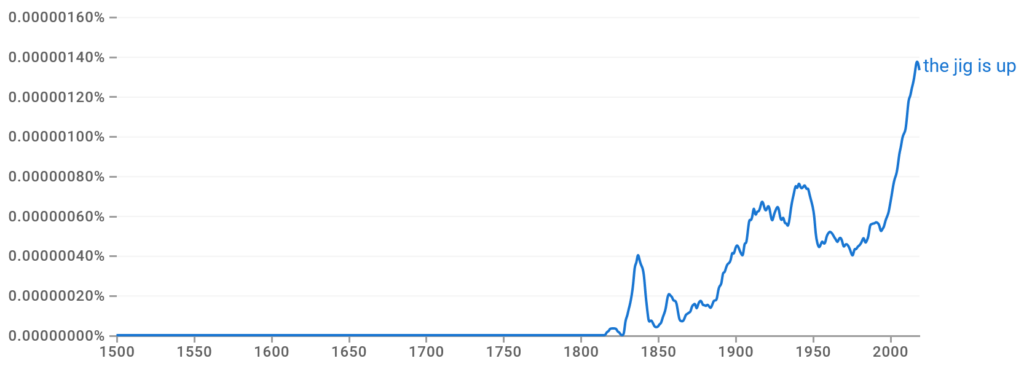The jig is up means that a deception or pretense has been uncovered and can no longer continue. It’s like saying, “I’ve figured out your lie!” This English language idiom is mostly used when a scheme or trick has been exposed, marking its conclusion.
Idioms, like the jig is up, are colorful sayings that don’t have a literal meaning tied to the combination of words used. They’re widely understood as metaphorical and are essential to the English language because they give us variety in our words.
But is there a right and wrong way to use an idiom? Yes, but don’t worry—I’ll cover all the details about the meaning of this phrase, its origin, contextual usage, various variations, and a few synonyms. I’ll even test you at the end.

What Does the Idiom the Jig Is Up Mean?
The idiom the jig is up means that a deception or secret has been exposed, and the truth is revealed.
Merriam-Webster says that the idiom the jig is up is “used to say that a dishonest plan or activity has been discovered and will not be allowed to continue.” So, if a deceitful plan or trick has been exposed, the jig is up!
It’s such a fun phrase to use, too! I can’t say it without smiling and always lay it on my kids when I’ve discovered they weren’t truthful about something. As soon as they hear me say it, they laugh and admit their wrongdoing. It’s just so much easier to parent with humor than with an iron fist.
Fun fact: In Newfoundland, Canada, a jig is one of the traditional dances that was brought over from Ireland and Scotland!
Literal Meaning vs. Figurative Meaning
The literal meaning of the jig is up is the song or dance is over because a jig is another term for a lively dance. (It’s also a term used in construction for a stencil, of sorts). Figuratively, the expression refers to a trick or scheme and implies that the act is over, much like a dance concluding.
What Is the Difference Between the Jig Is Up and the Gig Is Up?
Though similar sounding, the gig is up is just a common mispronunciation of the original phrase the jig is up. Both phrases convey the same meaning of an end to some kind of deception, but only one is correct: the jig is up.
Variations of the Idiom
- The gig is up (misspelling and mispronunciation)
- The jig’s over
- The jig is done
How Is the Jig Is Up Commonly Used in Context?
The idiom the jig is up signifies the revelation of a hidden truth or the exposure of a deception. In the following sections, explore the various ways this expressive phrase is commonly used, gain tips for its effective application, and discover examples that illustrate its use in different contexts.
What Are the Different Ways to Use the Jig Is Up?
- In detective stories: To announce the discovery of a criminal’s identity. “We found the missing evidence proving the gardener lied about his whereabouts the night of the murder. The jig is up!”
- When parenting: When a child’s small deception is uncovered. “You’ve been sneaking cookies all day, but the jig is up—I found your stash!”
- Casual exchanges with friends: To make light of how you found out a minor fib. “The jig is up! I knew you were planning a surprise party!”
What Are Some Tips for Using the Jig Is Up Effectively?
- You can use the phrase when revealing the truth or the end of a deceptive act.
- It fits best in a context where there’s been some form of pretense or scheme.
- Be mindful of the tone because it can be pompous in the wrong context.
- Also, read the room before using it. There have been times throughout American history when the word jig was considered a racial slur.
- It always works humorously!
Where Can You Find Examples of the Jig Is Up?
You probably won’t find modern examples of the jig is up being used seriously because it’s an older expression. But it’s the title of a song by Kendrick Lamar, written and produced in 2012.
For older millennials out there like me, you might immediately think of the Aerosmith song with the same name. Lord knows it’s been played on the radio a gazillion times.
It’s also a song by one of my favorite bands, Ice Nine Kills. Although it’s not one of their best, I personally love their cover of “I Can’t Help Falling in Love with You.”
In literature, it’s been used in titles and narratives over the years. However, a more recent use of it is in a cozy mystery book called The Jig is Up by Rachael O Phillips. (Great book, by the way, if you’re looking for something to read.)
What Is the Origin of the Idiom the Jig Is Up?

The idiom the jig is up originated in 16th-century England, aka Elizabethan times. Back then, in that region of the world, jig was another word for a trick or joke. When someone figured it out, they’d say, “The jig is up!”
Interestingly, the first example of the phrase the jig is up comes from a Philadelphia, PA newspaper dated 1800, though the jig is over was spotted in 1777.
How Did the Idiom Evolve Over Time?
Even though it began as an expression about dancing and playing jokes, the phrase has evolved to mostly relay the fact that someone’s been found out.
What Are Some Related Terms to the Jig Is Up?
With this one being such a humorous expression, it doesn’t always work, especially in serious contexts. Consider when, where, and how you want to express the notion and see which of these synonyms works better for you.

Synonyms
Antonyms
- Concealed
- Hidden
- A mystery
- Under wraps
The Jig Is Up: Test Your Knowledge!
Choose the correct answer.
What Have We Learned About the Jig Is Up?
The jig is up might not be as common as it once was. However, it’s still an idiom that encapsulates the moment of truth—where deception can no longer be sustained. Understanding and using this expression helps us appreciate the dramatic and revealing moments in stories and life. I really hope my breakdown of its meaning, origin, and various uses helped!
Use the quiz and also refer back to this guide anytime you feel that the idiom would work in your writing. And be sure to go check out hundreds of other idiomatic expressions on our site. If you can’t find one, let us know!
Enjoyed reading about this idiom? Check out some others we covered:
